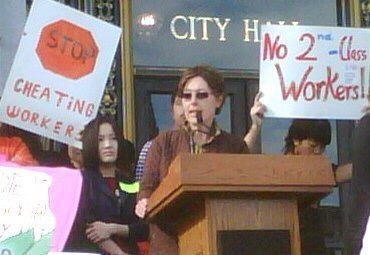When the San Francisco Office of Labor Standards Enforcement was established in 1996, it had a relatively limited mandate, watching to make sure that contractors respected the city’s prevailing-wage laws. But in the past 20 years, as the feds and the state have dropped the ball on minimum wages, universal health care, paid sick leave, anti-discrimination rules, and workplace standards, the city has passed a wide range of new ordinances – and the OLSE has taken on a much larger role as the top cop on local labor issues.

Since 2002, the person running that agency has been Donna Levitt, who started her career as a carpenter in 1980, when it wasn’t easy for women in that trade (to make a fairly radical understatement). She wound up as the first woman heading a building-trades local union, and was on the e-board of the SF Labor Council.
She was, and is, an advocate for workers, and has been pretty universally praised for her management of the increasingly important office. (Full disclosure, she also lives up the street from me and I see her in the neighborhood.) The Board of Supes honored her a few weeks ago when she announced her retirement.
Levitt has led the agency as it’s taken on the city’s sweat-free contracting ordinance, the displaced-worker protection act, a law limiting the ability of city agencies and contractors to discriminate against people who have arrest records or old, minor convictions that are irrelevant to the job, and so much more.
Her retirement leaves a big gap in an important (although often unheralded) city agency. And worker advocates are organizing to demand that the mayor appoint someone who is not only experienced in the field – in other words, no political pals with no credible resume – but someone who is a labor advocate, not from an employer and business background.
I am told by good sources that the downtown business community is lobbying the mayor to appoint someone who is more friendly to employers and less of a labor advocate.
Gordon Mar, director of Jobs with Justice, sent Lee a letter March 16 expressing his group’s concerns:
Since 2003, Jobs with Justice and our coalition partners have played a key role in the creation of most of the labor laws in this city, including the minimum wage, paid sick leave, health care security, fair chance and formula retail employee rights ordinances. … Strong enforcement of these laws remains critically important.
Mar told me that the OSLE should be run by somebody who has a lot of history and background in labor law, but also a record of fighting for workers’ rights. This isn’t a job, he said, for a person who has worked against labor or wants to see the existing laws turned back.
“Our side has had to wage a battle with employers – with the Golden Gate Restaurant Association, the Chamber of Commerce, the Committee on jobs – over all these laws,” he said. “We want to be sure the office is run by someone who stands with the workers.”
We’ve seen what happens when people who seem to have no interest in enforcing the existing laws take over city agencies. For years, open-government advocates were deeply frustrated by former Ethics Commission Director John St. Croix, who was a long, long way from being an advocate for cleaner government.
We have had people running the Office of Citizen Complaints in past years who came from law-enforcement. We have had planning directors who didn’t believe that developers should be required to follow the zoning laws.
You get the point.
Lee’s office isn’t commenting on the process, but I know that the mayor is interviewing people this week. It’s not a job that requires confirmation by the Board of Supes; he can pretty much pick the person he wants. (The OSLE director officially reports to the city administrator, but everyone knows the mayor will decide who gets hired.)
So this will be a telling moment for a mayor who has been overwhelmingly friendly to business interests, often at the expense of the rest of the community.
Some building trades unions are most concerned about the prevailing wage laws, and much less interested in the broader progressive workplace agenda.
Advocates fear that the mayor might lean toward someone like Pat Mulligan, who currently works for Lee as the local hire director and has been an official with the Carpenters’ Union. Mulligan is also on the board of the Alliance for Jobs and Sustainable Growth, a conservative group that includes the Chamber, the GGRA, and other pro-business groups.
Labor in this city is often fractious; the building trades (and the cops and firefighters) often take conservative positions and side with conservative politicians, and the nurses, teachers, and public employee unions (other than the cops are firefighters) are on the progressive side.
But in this case, Tim Paulson, executive director of the Labor Council, told me that he met with the mayor, and that the House of Labor is united: “We want someone who will make sure the laws are enforced, someone who can replicate the detail and attention [of Levitt] and someone who will keep the politics out of the enforcement process.”
There is some talk of splitting up the job, and letting the prevailing-wage enforcement go to one person and the rest of the job to another, but Paulson said labor is against that. “We want to keep the job in one place,” he said.
So the mayor will have to resist pressure from the downtown employers and choose one of the candidates labor has put forward – or risk alienating yet anothfser constituency at a time when he can barely walk out the door without getting surrounded by protesters.






